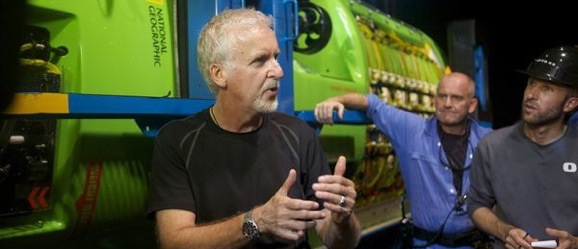James Cameron Is Getting Sued Over The Origins of Avatar
This article is more than 2 years old

While James Cameron gets ready to shoot the sequel films to Avatar, he is currently fighting a handful of lawsuits that claim he is not the original author of the 2009 3D spectacle. Whether or not these claims are true or false, Cameron is hard pressed to prove that his movie Avatar is completely his idea.
As THR reports, the lawsuit is against Cameron and his company, Lightstorm Entertainment. It was filed by Gerald Morawski, an artist who sold concept art for a film adaptation of William Gibson’s short story, Burning Chrome, which Cameron was developing at the time. After selling Cameron four pieces of his art, Morawski pitched the director on a story about the struggle between an evil mining corporation and an indigenous tribe. Sound familiar? Morawski feels he is entitled to some of the $2.78 billion box office that Avatar grossed in 2009 and 2010.
But James Cameron is fighting back. Last week, Cameron submitted an extensive, 45-page declaration detailing how he came up with the idea, themes, and sequels for Avatar, the Na’vi, and the world of Pandora. The document spans over five decades of Cameron’s life, starting in the 1960s, and cites moments like one day dreaming of being a scientist and exploring the moons of Jupiter. Here are are some of the highlights:
-In the early 1980s, Cameron worked on an unproduced project that was originally titled, “E.T.,” but says he had to change the title to “Mother.” Why? Cameron answers, “As I was writing it, I found out that Steven Spielberg was making a film called E.T. The Extraterrestrial, so I promptly changed the title of my story.” The project was never produced, but Cameron says elements became incorporated into Avatar.
-Cameron draws explicit direct connections between his works. He says the Paul Reiser character in Aliens was the direct prototype of the Giovanni Ribisi character in Avatar. He says some of the military gear of Rambo II became inspiration for the heavily armed gunships in Avatar. He says the idea of a neural-net was first explored in his Terminator films. And so forth.
The lawsuit seems frivolous. It sounds like Gerald Morawski wants a piece of that sweet $2.78 billion Avatar box office. Even if Cameron did steal a few details from Morawski’s pitch, how could you prove the theft? Avatar borrows from or references multiple narratives and mythologies, including Edgar Rice Burroughs’ John Carter of Mars, David Lean’s Lawrence of Arabia, and of course, Fern Gully. Let’s just hope this lawsuit doesn’t delay Avatar 2 & 3 any further.












